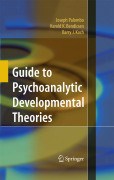
Guide to psychoanalytic developmental theories
Palombo, J.
Bendicsen, H.K.
Koch, B.J.
As the foundational theory of modern psychological practice, psychoanalysis and its attendant assumptions, predominated well through most of the twentieth century. The influence of psychoanalytic theories of development was profound and still resonates in the thinking and practice of today’s mental health professionals. Guide to Psychoanalytic Developmental Theories provides a succinct and reliable overview of what these theories are and where they came from. Ably combining theory, history, and biography it summarizes the theories of Freudand his successors against the broader evolution of analytic developmental theory itself, giving readers a deeper understanding of this history, and of their own theoretical stance and choices of interventions. Along the way, the authors discuss criteria for evaluating developmental theories, trace persistent methodological concerns, and shed intriguing light on what was considered normative child and adolescent behavior in earlier eras. Discusses comprehensivelythe broad range of psychoanalytic developmental theories and places each in historical context, filling a void, in the literature Organizes the content of each developmental theory by age categories Addresses seven psychological schools of thought, with an emphasis on the developmental perspective Lends to therevival of interest in psychoanalytic theory that was energized with the publication of APA’s Psychodynamic Diagnostic Manual (PDM) Brings to the forefrontthe ongoing integration of psychoanalysis and the neurosciences with a chapter on the neurobiology of attachment
- ISBN: 978-0-387-88454-7
- Editorial: Springer
- Encuadernacion: Cartoné
- Páginas: 290
- Fecha Publicación: 01/06/2009
- Nº Volúmenes: 1
- Idioma: Inglés
